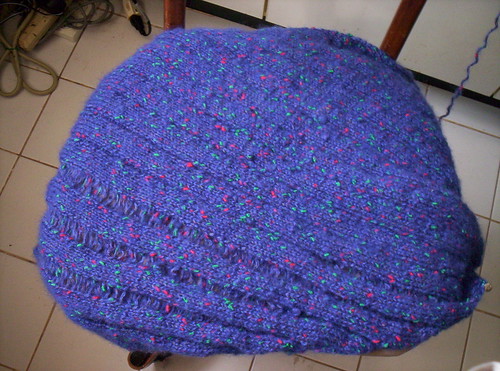Jewish law has many ways to help people cope with death. Most of them don't apply to me. No new clothes? I buy, on average, one shirt every two years. No music? I have a great memory for music, and mainly "play" it in my head after hearing a recording once or twice. No TV? Haven't watched since our color tube went, leaving us with a 17 year old black-and-pink set. No movies? Last movie I saw in a theater was Shrek 2. Before that--Shrek. No weddings? We live here in Israel, our families in the US, so that's an easy one.
So what's left? I could learn some gemara or read some Tehillim. But I already do that, anyway.
Then there's the biggie: Kaddish. Not exactly the world's least controversial topic given that, last I checked, I'm not my brother. I read up some, checked some sources, spoke to the local rabbi, and have been at minyan three times a day, saying Kaddish, for the past 13 weeks.
Some people say women only want to recite the Kaddish to "be feminists." That we're looking to take over men's roles instead of doing our own. I'd like those people (largely men) to try saying Kaddish as a woman must for a month or two and then let them talk.
Saying Kaddish, at least in the Orthodox minyans in which I have said it and particularly in my home shul, is an exercise in humility and humiliation. I'm not allowed to say the Kaddish alone--I have to arrange for a man to say it with me. Twice my husband was too sick to go with me to shul; I said Kaddish and none of the men answered. (Since then, my husband has arranged back-up kaddish-zuggers, who usually remember they're on. If they forget, I'm not allowed to prompt them--see next point.) I'm not aloud to say Kaddish above a whisper, because some men complained to the rabbi that the sound of my voice saying Kaddish made them think inappropriate thoughts. On the other hand, at least once each day some man walks in to the women's section to get a book, put down his books, put sunflower seeds out for the evening study session, or just to disguise how late he is getting to shul--usually when I'm bowing during Shemoneh Esreh, rear halfway in the air and unable to turn around. (Interesting--my voice behind a curtain is irresistible, my posterior is not. Not so great for the vanity, is that?)
Yes, I've read the responsa on women saying Kaddish, pro and con, and in this case they're irrelevant--the local rabbi's had his say (though his changed his psak in midstream because of community pressure, telling me to whisper the Kaddish, and saying wistfully "If it were 100 years from now..."). What gets me is how little the (male) community thinks of the women's section, with how little sanctity they perceive it compared to the men's section. The men's section is tidied after every prayer. In the morning, after the men have had a study session in the women's section, there are dirty tissues and sunflower seed shells on the floor, candy wrappers, books flung all over chairs, the table, and the floor, chairs tossed about as though they'd been wrestling with each other instead of the text. The curtain between the men's and women's section is consistently flung open all the way across. (I don't close it, aside from the little area in front of where I sit. It's not for my purposes, the curtain; I'm allowed to see the men. They can reach the curtain at least as easily as I can. Let them close it.)
I'm all out of ideas. I've talked to individual men. I've talked to the men officially in charge of the shul. How does one stop men from being pigs in the women's section?
I try to get to shul early and learn some gemara. Today I was learning Megillah 14b, which includes this gem: "While women talk, they use the spindle." In honor of that saying, here's what I've been spinning.

Sock yarn (still in single form) from a rainbow colored batt by Grafton Fibers. (As soon as I bought this, I found out Linda's no longer going to sell retail. Note to self: don't fall in love with this stuff.)
And there's been knitting. Clapotis v.3, out of horrible wool and mohair that my sister-in-law "inherited" from her mother, who is now in a Home, suffering from Alzheimer's. (Don't blame me--it's for my sister, and she spied the yarn in SIL's stash.)

And socks. Sockotta, no pattern, plain simple knit until you throw up. Started in the hospice while Mom was dying, finished here at home. Explain to me why from one side they look like they have nothing in common

and from the other they're a perfect match?

So, who's going to Chomesh tomorrow?













6 comments:
Can we interpret that as "when women talk, stuff gets done?"
I feel for you and hope the men get a clue.
**HUGS**
This frum woman stuff can be difficult. I remember when I tried to find a place that would let me say Gomel! I refused to let my husband say it (he wasn't almost in a plane crash..) and at least two rabbis said no.
I wish you the best!
Can you go to another shul?
I like that ours is very feminist at times because when these things come up I don't have that problem, even though I mostly boycott women's minyanin, have my husband make hamotzi etc. I loved simchat torah there. It was so nice to feel that us women were equally part of the celebrations!
I'm sorry that some of the men in the shul are not supporting your desire to honor and remember your mother. I'm keeping you in my thoughts. Hugs,
Tasha
I am sorry to hear that the men in your shul are so unsympathetic to your need to follow the mitzvah of saying kaddish. Having converted Reform, I just don't understand the attitude - and I'm not a feminist by any means. Anyone who thinks "improper thoughts" durring the Kaddish needs to grow up.
My thoughts are still with you.
Thanks for the insights into your faith walk! I've always been intrigued by Jewish traditions, as the historical beginnings of my faith came from there (I'm Lutheran). Even in the States, there are churches that do not allow women to take leadership roles, including reading the Scripture during service. Thankfully my church is not one of those, but there are still moments...
Post a Comment